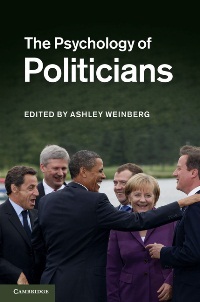 Based on research with politicians from the UK, Poland and Italy, this collection of essays hopes to offer new psychological insights into what makes our leaders tick. Suitable for students of political psychology and those looking for a broad introduction to the field, Julian Kirchherr feels that the book does lack an overall coherence and many conclusions are less than ground breaking.
Based on research with politicians from the UK, Poland and Italy, this collection of essays hopes to offer new psychological insights into what makes our leaders tick. Suitable for students of political psychology and those looking for a broad introduction to the field, Julian Kirchherr feels that the book does lack an overall coherence and many conclusions are less than ground breaking.
 The Psychology of Politicians. Ashley Weinberg. Cambridge University Press. 248 pages. January 2012.
The Psychology of Politicians. Ashley Weinberg. Cambridge University Press. 248 pages. January 2012.
What drives politicians? Do all politicians have similar personality traits? How does the stress of politics affect those at the heart of it all? Ashley Weinberg, senior lecturer in psychology at the University of Salford, explores these questions in this new collection of essays.
At a time when the public have access to almost constant news coverage of politicians and policy decisions, Weinberg’s collection attempts to satisfy the growing demand for knowledge about political figures. Having researched political psychology for more than two decades, the author believes that the “human factor” is a main influence in driving interest in politics. With political, financial, and environmental instability facing so many countries, it is easy to understand the surge in interest about what makes national leaders tick. We all need leaders who are fit to govern; the success or downfall of nations depends on it.
The ten essays which make up the collection are organised under four broad themes: Becoming a Politician, Functioning as a Politician, Coping with Pressure, and People as Politicians. For the most part interesting, unfortunately only a few chapters provide insightful hypotheses and recommendations.
Coming under the first theme, Richard Kwiatkowski considers MPs in UK parliament and asks which skills are necessary to rise to an influential position. Drawing from interviews taken from 1997 to 2003 involving backbenchers, whips, ministers, and parliamentary private secretaries, Kwiatkowski bases his findings on a rich set of data. He concludes that advancement in parliament mainly relies upon party loyalty, the ability to establish oneself as an indispensable expert for a specific policy area, and on finding a mentor. Entering parliament with a rich network and proactivity also promote one’s career.
Kwiatkowski’s collection of original quotes from parliamentarians and their staff is interesting to read, but the reflections upon what advances a politician’s career in the House of Commons fail to surprise. Most readers would expect networks and expertise to matter. In addition, one wonders why Kwiatkowski bases his essay on such an outdated set of data. Since 2003, digitalization has altered the work of a politician dramatically. How can politicians enhance their career prospects by making use of Facebook, Twitter and YouTube?
Agnieszka Golec De Zavala starts out more provocatively than Kwiatkowski. In her chapter on the cognitive skills of politicians across the spectrum, she discusses her finding that there is a “cognitive simplicity of the political right”. De Zavala defines cognitive simplicity as taking a narrow perspective on political problems and as a tendency to hold on to an opinion despite changing conditions and information.
Her finding is backed up with two studies, one interview series conducted with 46 mid to high level Polish politicians, and one survey conducted with 92 participants of eight Polish political party congresses. With regard to the limited sample size, she asks the reader to see her essay only as a “starting point for a future systematic research programme”. However, the political left in Poland will certainly be tempted to claim De Zavala’s research results as indisputable. Unfortunately, De Zavala does not reveal whether similar studies have been conducted in different countries. It would be interesting to explore whether her initial findings could be extrapolated.
While De Zavala presents original research results from Poland, Peter Bull’s article with the promising title ‘What makes a Successful Politician?’ remains disappointingly abstract. At its core is the Social Skills Model, a theory of social interaction and interpersonal communication. The evidence presented in the article is mostly anecdotal. His argument that communication skill trainings make a successful politician, for instance, is underscored as follows: “Famously, Margaret Thatcher, after becoming prime minister underwent training to lower her voice tone. She achieved a reduction in pitch of 46 Hz.” The rather trivial finding of his essay: “Politicians with good social skills are at a distinct advantage”. Well, who would have thought it?
Weinberg is most convincing when explaining the relevance of his chosen topic. Undoubtedly, it is highly interesting and far-reaching to explore the psychological traits of statesmen and backbenchers. They make “life-changing decisions on behalf of all”, as Weinberg writes. But what are the potential consequences of these psychological insights into politicians? Weinberg suggests a mental “health screening of serving politicians”, but his reasons for providing such a crude recommendation remain vague. The conclusions presented just don’t add up to convincing evidence.
The book falls into the trap of many edited volumes: the individual essays are poorly coordinated, and on occasion it is not even evident why some essays have been included in the volume at all. The article by Gianvittorio Caprara et alia on ‘The Political side of Personality’, for example, presents as its key finding that voters relate their perceptions of politicians’ traits to their own – a finding more about the psychology of voters than about the psychology of politicians.
After completing the book, the reader may still not have gained enough of a base understanding. Are politicians more or less future-oriented than voters? Are their decisions rather ruled by emotions or do they take a hard objective look at the facts? Is the average politician more extroverted than the average citizen? Unfortunately these questions remain unanswered.
Overall, the book might be suitable to students of psychology who seek a starting point and a broad introduction to research conducted in the field of political psychology. However, the uncoordinated essays fail to tell a coherent story, and only present partial research findings. In sum, the book, while promising and insightful in some parts, will probably disappoint many readers with an interest in political psychology.
——————————————————————————————-
Julian Kirchherr studies Public Policy and Management at the London School of Economics (LSE). He joined LSE’s Public Policy Group in January 2012. He is primarily interested in elite theories, environmental policy, welfare economics, human resource management, digitalization and futurology. In his spare time, he runs a career consultancy and serves as the editor-in-chief of Libertas, the magazine of the European Liberal Youth (LYMEC). Read more reviews by Julian.








1 Comments